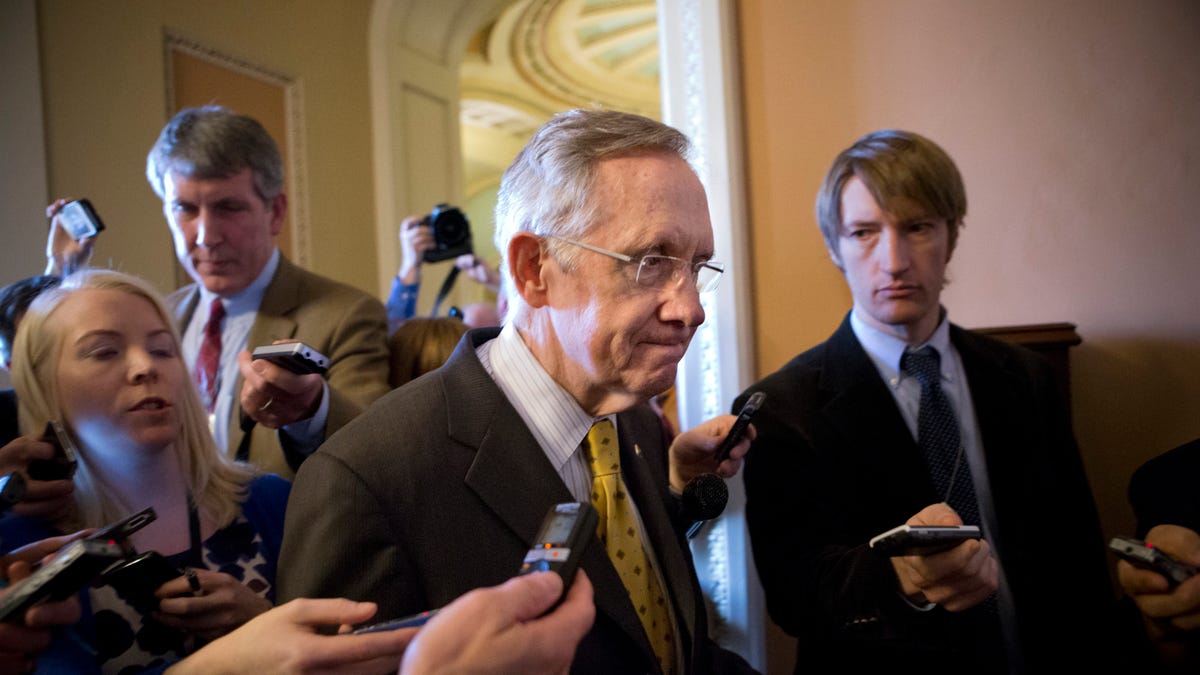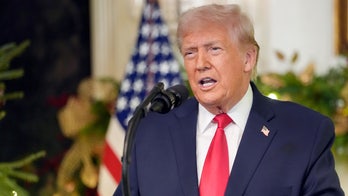
FILE: Dec. 30, 2012: Senate Majority Leader Harry Reid walks to meeting on Capitol Hill, in Washington, D.C. (AP)
Congressional Democrats and Republicans sharpened their political knives Sunday as lawmakers return to Washington this week to begin executing legislative agendas designed to help their respective parties in the November elections.
The first major battle will likely be over restoring long-term unemployment benefits, with Senate Majority Leader Harry Reid scheduled to hold a preliminary vote Monday on the issue.
“The first thing we want to get done is extend unemployment benefits,” he told Fox News on Sunday.
The benefits were not included in a two-year budget deal Congress reached before adjourning for winter break, but not before House Leader John Boehner, R-Ohio, made clear the money will not be restored unless offset but other spending cuts.
The White House is also applying pressure on congressional Republicans, issuing a statement on New Year’s Day that said President Obama supports the bipartisan Senate bill to reinstate benefits for the 1.3 million Americans who lost the insurance in the new budget deal.
Other Republicans have hinted they might go along with extending benefits if they win spending cuts from Reid elsewhere to pay for them.
"If the senator comes up with any kind of a reasonable idea to offset the $26 billion, I think that he might find some people that are willing to talk to him," Rep. Matt Salmon, R-Ariz., said on CBS’ “Face the Nation.”
Obama has already scheduled a White House event on Tuesday with some whose benefits expired at the end of December.
"Instead of punishing families who can least afford it, Republicans should make it their New Year's resolution to do the right thing and restore this vital economic security for their constituents right now," Obama said Saturday in his weekly radio and Internet address.
The fight is part of a large, emerging issue for Democrats and now Republicans across the country, closing the so-called income inequality gap.
On Sunday, Florida GOP Sen. Marco Rubio released a YouTube video in which he challenged “a big-government war on poverty” and announced his coming initiatives to address the issue, including repealing ObamaCare.
“What our nation needs is a real agenda that helps people acquire the skills they need to lift themselves out of poverty and to pursue the American dream,” Rubio says in the video.
To be sure, Republicans returning to Capitol Hill intend to focus on every facet of Obama's signature health care law, trying to capitalize on its failed rollout last year as they defend their House majority and try to seize control of the Senate.
Majority Leader Eric Cantor last week outlined the GOP-led House’s legislative agenda, leading with legislation that addresses the security of personal data for ObamaCare enrollees.
“The American people have witnessed the Obama administration failing in its attempts to fix a health care law that is broken and cannot be fixed,” the Virginia Republican said.
Cantor cited as other top legislative priorities the EPA regulatory process and Iran’s nuclear program, which he called “one of the most significant national security threats facing the United States.”
It’s unclear whether the House will tackle major legislation to overhaul immigration laws. Advocates remain hopeful. But some House Republicans still resist any legislation, fearing it would lead to a final bill that includes a path to citizenship for the estimated 11 million immigrants living in the country illegally.
Democrats will also press to raise the federal minimum wage from $7.25 an hour.
Sen. Chuck Schumer, D-N.Y., told ABC's "This Week" that he is unsure whether Democrats can cobble together 60 votes needed Monday to overcome a procedural hurdle en route to the upper chamber passing the unemployment package. However, he vowed Democrats would “come back at this issue” if they failed at first to get the votes.
He also said his party would prefer to pass the proposal without cutting elsewhere, as has been the case for previous extensions. But he told reporters Sunday he would listen to GOP suggestions.
Reid bristled at the idea of offsets.
“We have never offset emergency spending, that's foolish,” he told Fox News. “We've reduced the debt by $3 trillion. Let's start helping the middle class. The rich are getting richer, the poor are getting poorer.”
Such rancor ruled in the first session of the 113th Congress with few bills passed and sent to the president. The combination of divided government and the upcoming elections stand as an obstacle to major legislation in the second session, counting down to November when all 435 House seats and 35 Senate seats will be on the ballot.
Still, Congress must deal with some other significant unfinished business before delving deep into political votes and extended breaks for campaigning.
The Senate was to vote Monday on Obama's nomination of Janet Yellen to become the head of the Federal Reserve. If confirmed, Yellen would become the first woman to fill the powerful post, replacing Ben Bernanke.
Lawmakers also face a Jan. 15 deadline to agree on a spending bill to keep the government running and avoid a partial shutdown that roiled Congress last fall. Passage of legislation in December scaling back the automatic, across-the-board cuts gave the House and Senate Appropriations Committees time to draft a massive, trillion-dollar-plus measure to run the government through September.
A short-term measure is likely this month just to let the government continue operating.
The House and Senate spent a chunk of last year wrangling over renewing the nation's farm bill after passing competing versions of the five-year, roughly $500 billion measure. In dispute are crop subsidies and how deeply to cut the $80 billion-a-year food stamp program, with the House slashing $4 billion and the Senate $400 million annually.
Several other contentious issues also loom in the near term.
Twenty-six senators have signed on to a new Iran sanctions bill that Obama opposes while his administration negotiates with the Iranian government over its nuclear program. Proponents of the legislation are seeking to gain the support of further senators when Congress reconvenes, with the hope of a full Senate vote this month.
Although the issue may not be an immediate legislative priority for returning lawmakers, it could become a major point of discussion as advocates and opponents of fresh penalties make their cases.
Reid spared the administration a vote in December, but this month he may not be able to hold off proponents of tough sanctions.
The Associated Press contributed to this report.
























